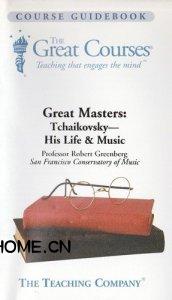By Professor Robert Greenberg
2002 | 6 hours and 8 mins | ISBN: 1565853784 | MP3 96 kbps | 266 MB
英文简介:
The life of Peter Ilyich Tchaikovsky (1840–1893) exhibits as close a link as you will find anywhere between an artist's inner world and the outward products of that artist's creative activity.
As a man, Tchaikovsky was defined by and indivisible from his music, which became an outlet for all the shifting moods of his turbulent soul. As Professor Robert Greenberg says, "If Tchaikovsky felt it, it found a way into his music."
As an artist—and it is worth recalling that he was the first full-time, formally trained, professional composer in Russian history—Tchaikovsky walked a fine and difficult line between his Romantic penchant for expression and the demands of Classical structure.
This delicate balancing act—between heart and head, emotion and reason, release and control, Russian expressive content and German technique—is a key to his music that you find amply illustrated by Professor Greenberg's musical selections and commentary.
A Suitable Profession
"To know Tchaikovsky's music, we must be familiar with the details of his life because his music, as his Sixth Symphony so abundantly demonstrates, is so often an intimate confession, a mirror of a personal life tormented by doubt and sexual anxiety," states Professor Greenberg.
Tchaikovsky was an unusually sensitive child, with an abnormal dependency on his mother and an obsessive love of music.
As a child of a 19th-century upper-class Russian family, however, Tchaikovsky's musical talent was not particularly encouraged. His parents had him educated for the more "suitable" profession of the civil service at the Imperial School of Jurisprudence in St. Petersburg.
It was at school that Tchaikovsky discovered his homosexuality. It was also while still a schoolboy that Tchaikovsky lost his mother to cholera. Her death was a shattering experience for the 14-year-old Tchaikovsky and it found poignant expression in his later music.
After Tchaikovsky graduated from the School of Jurisprudence, he was employed as a government clerk—but not for long. His obsession with music eventually won out, and he entered the newly founded St. Petersburg Conservatory.
He graduated in 1866 at the age of 26 and joined the teaching faculty at the likewise newly established Moscow Conservatory.
In 1868, his First Symphony was premiered; it already possessed the hallmark of Tchaikovsky's musical style: formal Classical construction coupled with Romantic expression.
Works you'll hear in the lectures are excerpted from:
Symphony no. 1 in G Minor, op. 13 (Winter Daydreams) (1868)
Six Songs, op. 6, no. 6 (None but the Lonely Heart ) (1869)
String Quartet no. 1 in D, op. 11 (1871)
Symphony no. 2 in C Minor, op. 17 (Little Russian) (1872)
Piano Concerto no. 1 in B-flat Minor, op. 23 (1874)
String Quartet no. 3 in E-flat Minor, op. 30 (1876)
Swan Lake, op. 20 (1877)
Eugene Onegin (1877)
Symphony no. 4 in F Minor, op. 36 (1877)
Serenade for Strings in C Major, op. 48 (1880)
Symphony no. 6 in B Minor, op. 74 (Pathétique) (1893)
Course Lecture Titles
1. Introduction and Early Life
2. A Career in Music
3. The First Masterworks
4. Maturity
5. Three Women—Tatyana, Antonina, and Nadezhda
6. “My Great Friend”
7. “A Free Man”
8. The Last Years, or Don't Drink the Water
官网: http://www.thegreatcourses.com/tgc/Courses/course_detail.aspx?cid=753







评论0